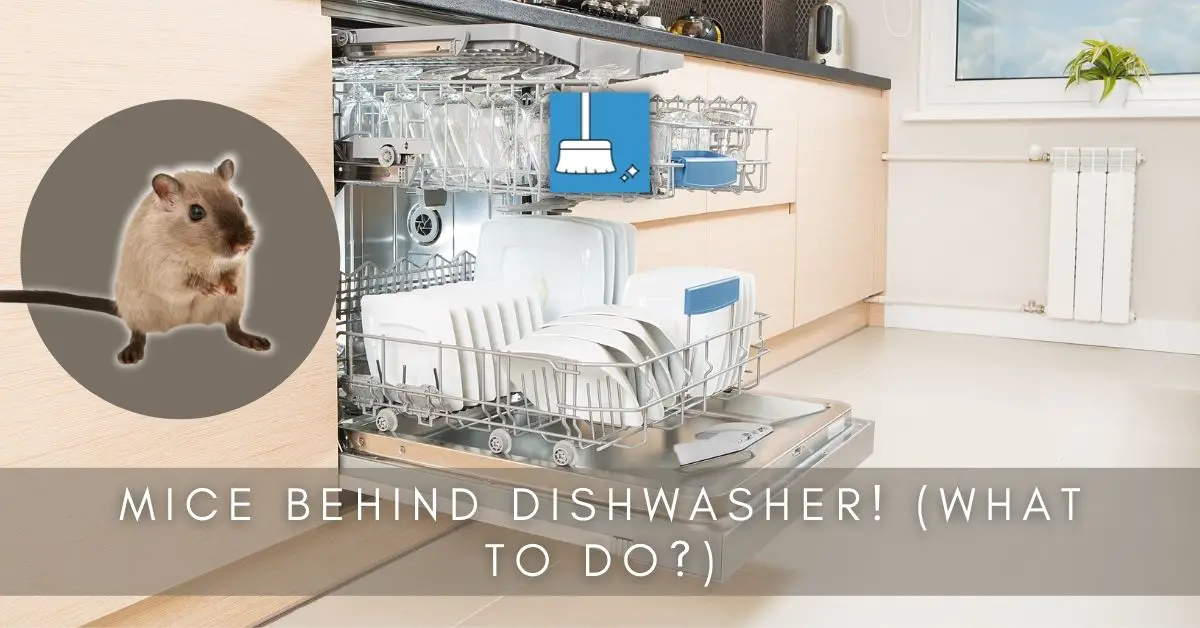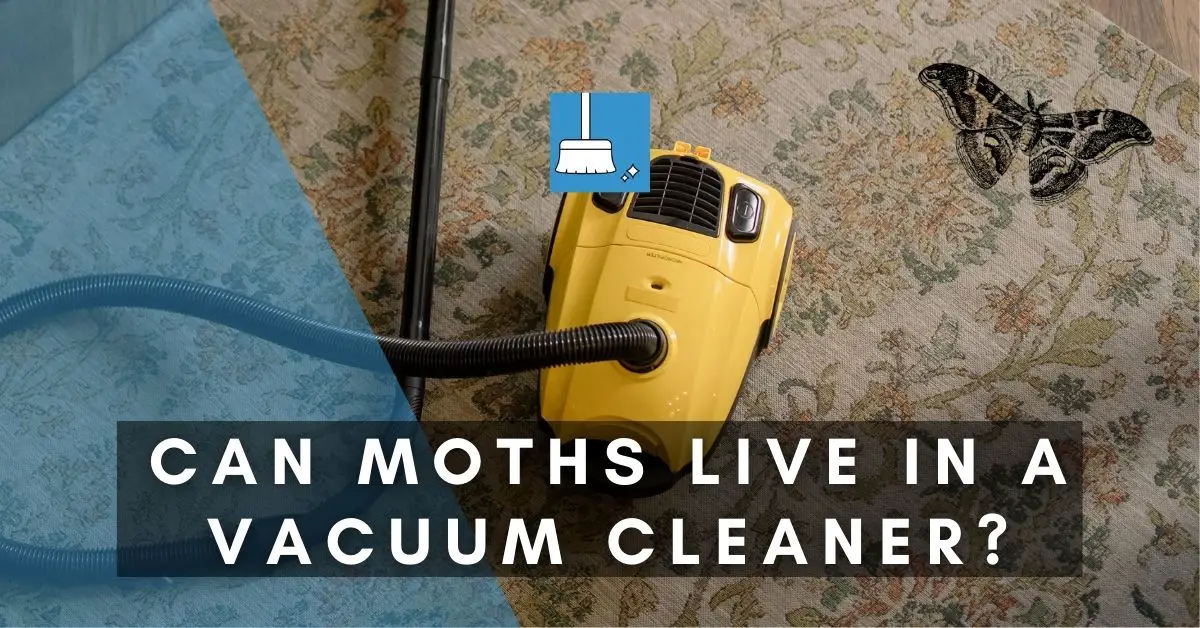You may notice strange sounds at night coming from the kitchen, crumbs, and urine stains on the kitchen floor.
If you look under your dishwasher and other appliances, you may notice small droppings. That is probably a mouse or mice having settled in your kitchen.
Dishwashers attract mice due to regular access to food particles and crumbs. This article highlights what to do if you find mice behind your dishwasher, how to get rid of them, and how to clean mice droppings.
Mice Behind the Dishwasher? (What to Do?)
Mice can live anywhere; where there is access to food and water, and away from predators.
The last thing you want is mice and other rodents in your home. Mice will also look for warm spaces, especially when winter approaches. Mice are most active at night, so you may not notice them during the day.
Getting rid of mice is crucial, to prevent diseases such as hantavirus.
Signs of Mice Infestation
The following tell-tale signs will indicate the presence of mice.
1- Mice Droppings
These dropping are dark and small and can be scattered around the house. They can be in kitchen cabinets, drawers, and in corners.
2- Noises
Scratching noises, especially come from the walls as mice burrow their way around. Mice can chew through cardboard and wiring. You will hear these noises mostly at night.
3- Chew Marks
You will see gnawed holes in plastic, wiring, wood, packaged food, and cardboard. Mice can be a fire hazard as they can chew the wiring and shielding of cables.
4- Foul Smells
Mice’s urine has a strong smell. This will be more noticeable in closed areas.
5- Nests
Mice use paper and soft items to make a nest. If you find these in a dark corner, along with droppings and track marks, it means there is a mice infestation.
Why You Should Be Worried About Mice?
Mice can carry viruses in their droppings, urine, and saliva. Diseases such as Hantavirus can be fatal. Other diseases such as salmonellosis can also be spread through mice. (Source)
Never vacuum or sweep away mice droppings. They need to be removed carefully and the whole place should then be disinfected.
Can Mice Live Behind a Dishwasher?
Mice can live behind the dishwasher as there is continuous access to plenty of food and crumbs. It is also a good hiding place as they are out of reach of animals such as cats.
Proof of mice living behind the dishwasher:
1- Mouse droppings and urine stains on the floor under the dishwasher.
2- Mouse droppings in the dishwasher.
3- Food crumbs under the dishwasher.
4- Pull out the dishwasher and check for gnawed hoses and wiring as well as leakages.
Once you suspect that there are mice around the dishwasher, you will need to remove the appliance and clean the floor and area around the dishwasher. You will also need to set traps to get rid of the mice.
Can a Mouse Get into a Closed Dishwasher?
Yes, mice can get inside a closed dishwasher. Mice can squeeze through very small holes, so they can get inside a dishwasher through the air vents. They can also get in by chewing water inlets and other plastic parts of the dishwasher.
Examine your dishwasher for any cracks or holes. You can cover the air vents with steel wool to prevent mice from entering the dishwasher. Mice cannot chew steel wool.
How to Seal the Gap Under the Dishwasher?
The space under the dishwasher should be sealed to prevent unwanted inhabitants from getting underneath. You can buy filler strips from a DIY store and cut them according to size to fit the gaps between the dishwasher and the cabinets.
Things to Note:
1- If you seal the gap between the dishwasher and floor, you may possibly trap the mice inside.
2- It will not be easy to sweep out the crumbs and other food particles from under the dishwasher.
How Do I Get Rid of Mice Under My Dishwasher?
It is crucial to get rid of mice as soon as possible, to prevent contamination and spread of certain viruses.
If you have mice lurking around your dishwasher, there are a few ways to get rid of them:
Method 1: Traps
There are several different types of mice traps available:
a) Snap Traps – These are the most common traps available. You put bait on the plate and pull back the lever. When the spring is triggered, the metal bar snaps and kills or injures the mouse.
The trap is also reusable. Keep it away from young children and other pets.
b) Catch and Release Traps – These do not kill the mouse. These are more humane and once the mouse is caught, you can release it somewhere far away from your home.
c) Electric Mouse Traps – These types electrocute the mouse. The mouse dies almost immediately. The trap is also reusable. Keep the trap hidden away from children and pets.
d) Glue Traps – You put some bait on the trap to attract the mouse and when it walks on the trap, the mouse gets glued to the trap. The mouse then ends up dying due to a lack of food and water.
Keep such traps away from small children and other pets. If you come into contact with the glue, use vegetable oil to remove the glue.
These traps can be set under the dishwasher to catch the mice. Peanut butter is a popular choice to stick on traps to attract the mouse.
If a mouse is caught and is dead, wear gloves and place it in a plastic bag before putting it in the trash.
Method 2: Ultrasonic Mouse Repeller
This is a device that is plugged in, and it releases an ultrasonic wave to get rid of mice. There is no need to set any traps and is the most humane way to keep them away.
The only problem is that the waves may not reach all the mice-infested areas.
Method 3: Use Essential Oils
Clove and peppermint oils tend to keep mice away. Dip cotton balls in the oil of your choice and place them in areas where you suspect the mice are.
Method 4: Steel wool
Use steel wool to fill the gaps in areas where mice can crawl through. Mice do not chew through steel wool.
However, when compared with steel wool, it is seen that copper wool works even better for mice prevention in bigger holes.
Method 5: Cats
Cats are the natural enemies of mice. If you are allowed to keep a cat, it may be the best thing to keep mice away.
Whichever method you choose, ensure to keep the devices for capturing mice away from young children and other pets.
If infestation is severe, call professional pest control agencies to help deal with such situations.
How Do You Clean Mouse Droppings? (Behind The Dishwasher)
Mouse droppings are dangerous if you come into contact with them. Mice droppings contain harmful viruses and bacteria and need to be cleaned up carefully, using gloves and wearing face masks.
Steps to clean mouse droppings behind the dishwasher:
STEP 1: Switch off the power supply.
STEP 2: Cut off the water supply.
STEP 3: Gently pull out the dishwasher.
STEP 4: Ventilate the area by opening the windows for at least half an hour.
STEP 5: Wear rubber gloves and a face mask.
STEP 6: Make a mixture of bleach and water (one and a half cups of bleach to a gallon of water) and spray the droppings and urine and let it soak for up to 5 minutes.
STEP 7: Take a paper towel and carefully pick up the droppings and along with the gloves, dispose of them in a garbage bag that can be sealed.
STEP 8: You can also disinfect the dishwasher and the area around the dishwasher.
STEP 9: Also mop the floor and clean the countertops with disinfectant.
STEP 10: Put the dishwasher back and reconnect the water and electricity supply lines.
The droppings should never be vacuumed as this creates dust. If the droppings contain Hantavirus and the dust is inhaled, this can be dangerous as Hantavirus can be quite severe.
How to Clean a Dishwasher if a Mouse has been Inside?
Mice can get in the dishwasher through air vents. If you spot any droppings, clean them up as outlined above, by wearing protective gear and using a bleach solution. You can run a hot water cycle again together with vinegar to completely clean the dishwasher.
Caution: Never use washing machine cleaner in a dishwasher.
How To Prevent Mice from Coming Back Again?
You finally manage to get rid of the mice already in your home. But you still need to take action to prevent more mice from coming to your home.
Steps to prevent mice from returning:
1- Keep the areas, especially in the kitchen clean. Be sure to sweep under the dishwasher every day and clean up crumbs and spills immediately. Also, keep countertops clean.
2- Store food in glass or metal containers that can be tightly sealed. Mice can chew through other materials, but dry foods and grains kept in glass or metal containers will deter mice and keep food secure.
Store pet food in such containers and store them high above the ground.
3- Seal entry points and cracks around the house, no matter how small they are. Mice can squeeze through very tiny spaces, as small as ¼ inch. Use caulk and steel wool to seal such areas.
4- Natural repellents deter mice from entering your property, such as:
a. Essential oils made of cloves, peppermint, and cayenne
Soak the cotton balls in the oil and leave them in areas previously infested by mice. Be sure to regularly change and put fresh cotton balls.
b. Diluted Apple Cider
Make a solution and spray it around the house. Keep spraying regularly.
5- Mice like to find a safe space to give birth. They look out for warm, soft materials such as cotton, paper, and other forms of insulation. It will be close to a source of food.
6- Garbage bins will not only attract mice but also stray animals. Keep the bins far from the house. Also, make sure the garbage bins are tightly sealed.
7- If you have a bird feeder, do not keep it very close to the house. Feeders usually attract mice and other rodents.
8- Get a cat. Cats will catch mice before they can form nests.
If you live in a place that does not allow pets, buy ammonia, and leave ammonia-soaked cotton balls in certain places. Since ammonia smells like a predator’s urine, it may deter mice.
Kitty litter can work as well to prevent mice from coming into the house.
9- Keep the garage doors closed, especially at night. If you have a patio with sliding doors, use screen protectors to keep mice and other creatures out.
10- Use ultrasonic sound devices and place them where the mice used to frequent.
Do Mice Eat Dishwasher Tablets?
Mice generally eat grains and seeds, pet food, fruit, meat, and leftovers. They also chew on wiring, cardboard, and paper.
Mice may not eat dishwasher tablets as the scent may deter them. Even if they nibble on a tablet, chances are it may not be enough to kill them.
If mice have regular access to foods they eat, they would not chew on dishwasher tablets.
Conclusion!
If you suspect there are mice in the house, take steps to get rid of them. Some people do not like getting mice killed in mice traps, so they opt for a more humane way of getting rid of them.
The important thing to remember is to clean up the mice-infested areas thoroughly and always keep such areas clean. Once you get rid of the mice in the house, use various methods of keeping them out.
If the problem gets too severe, hire a pest control agency to assist in getting rid of mice and keeping them out permanently.





